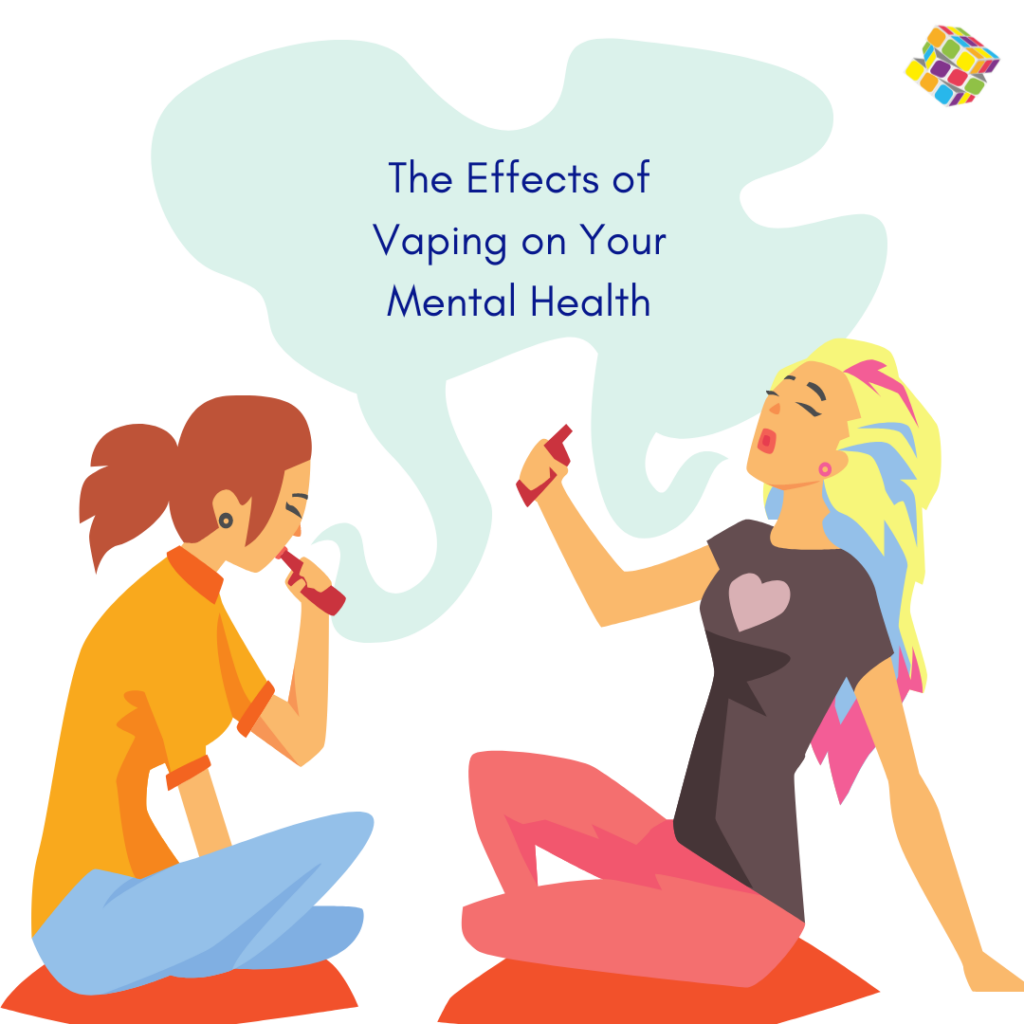Vaping has become a common trend among the youngsters these days, because of it being colorful on the outside and flavourful on the inside. It is a sweet alternative to cigarettes and weed. Beyond its surface appeal, vaping stealthily takes a toll and envelops young minds in a haze of anxiety.

We will explore the hidden effects and acquire understanding of how vaping impacts a teen’s wellbeing on this journey. Vaping can have several effects on the mental health of an adolescent. The effects include: eating disorders, stress and anxiety, depression, suicidal thoughts, learning difficulties, mood swings and isolation.
Eating disorders: Vaping can significantly alter a teen’s connection with food and increase the risk of eating problems. Due to the hand-to-mouth action of vaping, which resembles the oral fixation associated with eating, the act of vaping itself may be used as a substitute for meals. Additionally, nicotine, a frequent component of e-cigarettes, can inhibit appetite, resulting in less food consumption. This alteration in eating habits and the pressure from society to maintain a particular body image can start a dangerous cycle. In an effort to manage their weight, teens may engage in disordered eating habits including rigid diets or excessive exercise.
Stress and anxiety: Teenagers’ stress and anxiety levels might be significantly increased by vaping. The extremely addictive chemical nicotine, which is present in many vaping products, has the ability to change brain chemistry and intensify the body’s stress response. Nicotine withdrawal symptoms can make anxiety worse and start a cycle of dependence. Teenagers may feel obliged to engage in vaping in order to be accepted by their classmates, but this social pressure to fit in and adapt to vaping trends can also cause tension and anxiety. A continual feeling of fear and anxiety might also result from the lack of clarity about the long-term health repercussions of vaping.
Depression: Teenagers’ depression may begin or worsen as a result of vaping. Nicotine, a prevalent ingredient in e-cigarettes, has an impact on the reward system and neurotransmitters responsible for controlling mood. The abnormalities in serotonin and dopamine levels, which are essential for preserving a stable mood, can result from this disruption. Furthermore, the social and emotional effects of vaping, such as exclusionary or lonely sentiments, can set off or exacerbate depressive symptoms. Additionally, the reliance and withdrawal that can be caused by vaping’s addictive nature can heighten depressive and hopeless feelings.
Suicidal thoughts: The brain can be affected in a number of ways by nicotine vaping, including through changing neurotransmitter levels and impacting mood. Addiction can cause mental health problems, and vaping during adolescence might have more severe consequences. The assertion that using e-cigarettes alone can cause suicides is unsupported by any concrete evidence. Additionally, using drugs or alcohol to deal with emotional problems is another option.
Learning difficulties: Teenagers’ academic ability can be greatly impacted by vaping. The nicotine in e-cigarettes can interfere with brain development, especially in regions involved in cognition, memory, and attention. Nicotine has an impact on neurotransmitter activity, which decreases focus, shortens attention span, and hinders learning. Additionally, vaping can introduce toxic substances into the body, which can further impede cognitive and brain function. Vaping’s addictive nature also takes focus and effort away from academic endeavors.
Mood swings: Teenagers who vape may experience mood changes owing to the impact of nicotine and other substances. E-cigarettes contain nicotine, a highly addictive drug that can change brain chemistry and neurotransmitter levels, causing mood swings. As its effects wear off, it may initially cause sensations of pleasure and relaxation, but it may also result in irritation, anxiety, and agitation.The addictiveness of vaping may also contribute to mood swings because cravings and withdrawal symptoms increase susceptibility to emotional instability. Further affecting mood and causing mood swings are the social and emotional effects of vaping, such as peer pressure or feeling isolated.
Isolation: Teenagers who vape may get isolated and feel cut off from their friends and social activities, which can have a significant negative impact on their development. Teenagers may engage in vaping behaviors, frequently at the expense of other social relationships, due to the attractiveness of the vaping culture and a desire to fit in. This may result in a gap between vapers and non-vapers, making individuals who choose not to vape feel excluded and alone. Additionally, vaping’s addictive nature can take up a lot of time and attention, which can result in a withdrawal from formerly enjoyable activities and decreased social involvement.
In conclusion, this is an urgent issue that cannot be overlooked regarding how vaping affects teenage mental health. The effects are severe, ranging from increased anxiety and sadness to the possibility of eating disorders and suicidal thoughts.

Great information shared.. really enjoyed reading this post thank you author for sharing this post .. appreciated